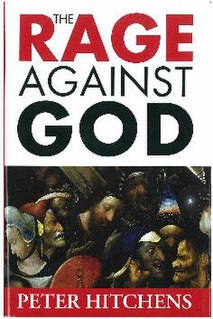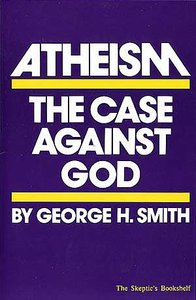Agnosticism is the view that the existence of God, the divine, or the supernatural is not known or knowable with any certainty. If the question is "Does God exist?", "yes" would imply theism, "no" would imply atheism, and "I'm not sure" would imply agnosticism—that God possibly can or cannot exist. Another definition provided is the view that "human reason is incapable of providing sufficient rational grounds to justify either the belief that God exists or the belief that God does not exist."

Omnibenevolence is defined by the Oxford English Dictionary as "unlimited or infinite benevolence". Some philosophers have argued that it is impossible, or at least improbable, for a deity to exhibit such a property alongside omniscience and omnipotence, as a result of the problem of evil. However, some philosophers, such as Alvin Plantinga, argue the plausibility of co-existence.

Negative atheism, also called weak atheism and soft atheism, is any type of atheism where a person does not believe in the existence of any deities but does not necessarily explicitly assert that there are none. Positive atheism, also called strong atheism and hard atheism, is the form of atheism that additionally asserts that no deities exist.
Michael Lou Martin was an American philosopher and former professor at Boston University. Martin specialized in the philosophy of religion, although he also worked on the philosophies of science, law, and social science. He served with the US Marine Corps in Korea.
Theological noncognitivism is the non-theist position that religious language, particularly theological terminology such as "God", is not intelligible or meaningful, and thus sentences like "God exists" are cognitively meaningless.

In the philosophy of religion, Reformed epistemology is a school of philosophical thought concerning the nature of knowledge (epistemology) as it applies to religious beliefs. The central proposition of Reformed epistemology is that beliefs can be justified by more than evidence alone, contrary to the positions of evidentialism, which argues that while belief other than through evidence may be beneficial, it violates some epistemic duty. Central to Reformed epistemology is the proposition that belief in God may be "properly basic" and not need to be inferred from other truths to be rationally warranted. William Lane Craig describes Reformed epistemology as "One of the most significant developments in contemporary religious epistemology ... which directly assaults the evidentialist construal of rationality."

Antony Garrard Newton Flew was an English philosopher. Belonging to the analytic and evidentialist schools of thought, Flew was most notable for his work related to the philosophy of religion. During the course of his career he taught at the universities of Oxford, Aberdeen, Keele and Reading, and at York University in Toronto.
George Hamilton Smith is an American author, editor, educator and speaker, known for his writings on atheism and libertarianism.
Atheism is in the broadest sense a rejection of any belief in the existence of deities. In a narrower sense, atheism is specifically the position that there are no deities and any statements to the contrary are false ones. This is not to be confused with 'negative atheism' which declares that there is no evidence or knowledge about gods or god and thus has no belief in reference to a God or gods. It is an important distinction because young children are not 'atheists' simply because they have no view on God or gods. The infant would have no evidence for any view on the topic. The English term 'atheist' was used at least as early as the sixteenth century and atheistic ideas and their influence have a longer history.
The Atheist's Wager, popularised by the philosopher Michael Martin and published in his 1990 book Atheism: A Philosophical Justification, is an atheistic response to Pascal's Wager regarding the existence of God.

Russell's teapot is an analogy, formulated by the philosopher Bertrand Russell (1872–1970), to illustrate that the philosophic burden of proof lies upon a person making empirically unfalsifiable claims, rather than shifting the burden of disproof to others.
Criticism of atheism is criticism of the concepts, validity, or impact of atheism, including associated political and social implications. Criticisms include positions based on the history of science, philosophical and logical criticisms, findings in both the natural and social sciences, theistic apologetic arguments, arguments pertaining to ethics and morality, the effects of atheism on the individual, or the assumptions that underpin atheism.

The God Delusion is a 2006 book by British evolutionary biologist, ethologist Richard Dawkins, a professorial fellow at New College, Oxford and, at the time of publication, the Charles Simonyi Chair for the Public Understanding of Science at the University of Oxford.

Implicit atheism and explicit atheism are types of atheism. In George H. Smith's Atheism: The Case Against God, "implicit atheism" is defined as "the absence of theistic belief without a conscious rejection of it", while "explicit atheism" is "the absence of theistic belief due to a conscious rejection of it". Explicit atheists have considered the idea of deities and have rejected belief that any exist. Implicit atheists, though they do not themselves maintain a belief in a god or gods, have not rejected the notion or have not considered it further.

The Portable Atheist: Essential Readings for the Nonbeliever (2007) is an anthology of atheist and agnostic thought edited by Christopher Hitchens.
Atheism, in the broadest sense, is an absence of belief in the existence of deities. Less broadly, atheism is a rejection of the belief that any deities exist. In an even narrower sense, atheism is specifically the position that there are no deities. Atheism is contrasted with theism, which in its most general form is the belief that at least one deity exists.

Charles Lee Smith was an American atheist and white supremacist author and activist widely known for being the last successful conviction for blasphemy in the United States.
Agnostic atheism is a philosophical position that encompasses both atheism and agnosticism. Agnostic atheists are atheistic because they do not hold a belief in the existence of any deity, and are agnostic because they claim that the existence of a deity is either unknowable in principle or currently unknown in fact.
The term New Atheism was coined by the journalist Gary Wolf in 2006 to describe the positions promoted by some atheists of the twenty-first century. New Atheism advocates the view that superstition, religion and irrationalism should not simply be tolerated. Instead, they should be countered, criticized, challenged by rational argument, especially when they exert undue influence, such as in government, education, and politics.

The Rage Against God is the fifth book by Peter Hitchens, first published in 2010. The book describes Hitchens's journey from atheism, far-left politics, and bohemianism to Christianity and conservatism, detailing the influences on him that led to his conversion. The book is partly intended as a response to God Is Not Great, a book written by his brother Christopher Hitchens in 2007.









